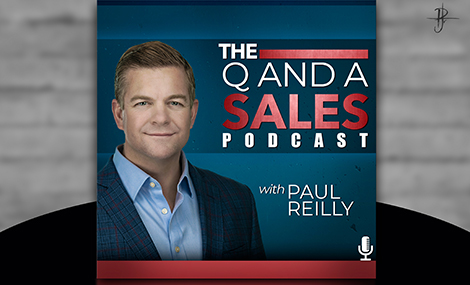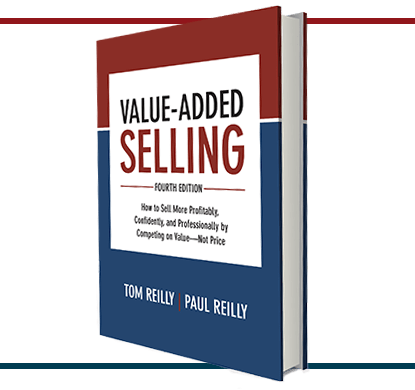Paul explains the importance of building solid relationships with your customers.
Show Notes
Relationship selling IS NOT DEAD! It is alive and kicking.
Top sales achievers consistently attribute their sales successes to their customer relationships.
Price is only an issue in the absence of value. The relationships you build with customers create immense value.
Every relationship you build is going to generate more opportunity for you to grow and your business to grow.
Did you enjoy the podcast? Go to Apple Podcasts to rate/review the podcast: https://podcasts.apple.com/us/podcast/the-q-and-a-sales-podcast/id1485103513. Click “Listen” then the “ratings and reviews” button.
Visit www.ToughTimer.com to get started on the 30-Day Tough-Timer Challenge!
Order your copy of Selling Through Tough Times from Amazon or Barnes & Noble!
Click here to purchase the latest edition of Value-Added Selling!
Interested in our public seminar offerings? Click here to learn more.
***
Thank you for tuning in. Our show is updated weekly with the questions you ask. So, please go to the home page to ask the question that you want answered.
Thank you to our production team at The Creative Impostor Studios.
Be sure to follow our show in your favorite podcast app and share this episode with a colleague or friend.
And most importantly…make it a big day.
How important are customer relationships?
(Transcribed from podcast)
Today we’re going to talk about customer relationships. And actually, this idea came from a conversation I had with a sales leader earlier this morning. We were talking about the importance of relationships. And, we had a, I mean, really-gosh, a 20-minute conversation about how important relationships are. So that’s what we’re going to address on today’s show. I’m going to share a couple of ideas on how to build solid relationships with your customers. I’m also going to share a few data points that prove some of these sales pundits wrong. So, we’ll get into that. The question we are going to answer today: “How important are customer relationships?”
Before we do that though, pick up your copy of Selling Through Tough Times and Value-Added Selling. In both of these books, we highlight the importance of relationship building and partnering with customers. In fact, in Selling Through Tough Times, I detail why a recession or why a downturn or any tough time is really an opportune time to build solid relationships with customers.
In short, one thing I highlight in Selling Through Tough Times is the fact, when you go through a struggle, customers and sellers that struggle together stay together. And in the book, I talk about that in the Partnering chapter. In Value-Added Selling, we talk about relationship building. And, in fact, I’m going to share some of the data points from our research in Value-Added Selling today. So, with that being said, let’s get to it: How important are customer relationships?
Well, it drives me nuts when I hear sales experts or I look at LinkedIn and, or I read a new sales book and I will hear that relationship selling is dead, that relationships don’t really matter as much as they used to. And our research continues to show that relationships are absolutely critical. Relationship selling is not dead; it is alive and kicking. And I have countless examples from people that I train, from companies I work with, to showcase when they build a relationship, they’re able to win more business directly because of the relationships that they build. And I’m going to share some data to build on that as we go through this episode.
So here’s one important element. We analyzed top-achieving salespeople. When we use the word top achiever, we’re referring to the top 10% of salespeople. So, think of your organization, you’ve got 100 salespeople in your company, we constantly research those top 10, those 10 that are going to outperform everyone else. One of the things we focused on in our latest best sales practices study, we asked top achievers how much of their success is attributed to the relationships they have built with their customers. And we were shocked to find that it was high. Now, obviously knew that a certain percentage of their success is going to be due to relationships. We were shocked at how high the number was. Our research shows 79%, nearly 80% of the success top achievers experience is due to the relationships that they build.
Now, what’s even more striking— After we completed this survey, we had an opportunity to poll and ask questions to a group of purchasing agents. And after we took some percentages and averaged them out, here’s what purchasing agents told us, that 59% of the success they experience in their role is attributed to the relationships they build with salespeople. One of the things we talk about in Value-Added Selling is the fact that success is a two-way street. Relationship building is a two-way street. Those top performers, they come through for their customers. They deliver so much value that it’s nearly impossible for any seller to try to break in and break away.
We’ve got to remember that price is only an issue in the absence of value. And the relationships you build create, almost, a great wall to protect what you have built with your customers. So keep that in mind, that nearly 80% of your success could be attributable to the relationship you have with customers.
Now, another element here, we asked buyers in a recent survey, “Why would you choose one supplier over another?” We gave them about nine different options to choose from. And listen to this, in both questions—not just one of them, in both questions—relationship with the salesperson ranked higher, meaning more important, than price. We asked, “Why would you choose one partner over another?” Relationship with the salesperson ranked higher than price on both occasions. Guys, it’s not all about price.
Now, the final data point I’ll share with you is more on the tactical side of it. How do you build relationships? Well, we know that any good relationship requires the foundation of trust. You need empathy; you need to think of the other person before thinking of yourself. And what was interesting is how top achievers build relationships. Yes, they’re trustworthy. Yes, they think of their customers, but 71% of top achievers in our study use entertainment to build relationships. Entertainment is a catchall term. I get it. That could mean anything from, hey, let’s go take them out golfing. Let’s take them to some nice dinners, incentive trips, whatever it may be. Entertainment is a vital part of building relationships.
And I know, right now, someone’s legal department is listening to this, or human resources, and saying, “Oh, we can’t use entertainment anymore. We can’t take the risk of showing this or that,” and my thought is, entertainment is one of the greatest benefits of selling. You think about selling—it is a knockdown, drag out, kick-in-the-teeth profession. And one of the benefits of being in sales and dealing with all of that is that you get to entertain. And so, every executive listening to this, every business owner, every HR person who says, “Oh, we can’t entertain. Those entertainment dollars…, they just don’t make sense. They don’t add up.” Yes, it does. For every dollar you spend on entertainment, you’re going to get it back 100 fold. Make entertainment part of your process. So again, 71% of top achievers use entertainment to build those relationships.
Now, in the final few minutes here, I want to share three ideas to help you build customer relationships. And these are tactics you can us, one of which, make your customer look like a hero. Make them look like a hero. You may sell software, you may sell belting, you may sell banking services, insurance, whatever it is, that’s the product or service you sell, but you are in the hero business. Think of your top 10 customers—top 10 customers that you’re interacting with. Get a list of all the contacts that you have, those key contacts. You probably have 30 to 40 contacts. Look at each one of those names and ask yourself, “How can I make this individual look like a hero?”
One salesperson in our training did that, and here’s how he did it. Selling belting to a large warehouse—big million-square-foot warehouse. And he’s selling belting that moves product around the facility. So, this salesperson was trying to sell a new belting product that’s going to last longer. It’s going to save money in the long run. And the procurement buyer decided, “Okay let’s go with it. Let’s move forward.” Now there was a little hesitancy because they were going to have to pay a little bit more for a product that would last longer. Well, this procurement buyer was challenged by the management team. Management came down and said, “Why are you spending more for this product?” And he said, “Well, it’s going to last longer.” They said, “Well, we need to see the data.”
So, the salesperson took this as an opportunity to make him a hero, and he went through, he calculated how much money they were going to save. He generated a comprehensive report detailing how much money they saved as a result of his decision. He sent that to him. This procurement buyer then presented it to the group of managers. The management team was thrilled. In fact, this is one of the things that led to his eventual promotion by thinking in these terms, making better long-range business decisions. That’s an example of making your customer a hero.
Next thing, and this is especially relevant for new salespeople. I know a lot of new salespeople are listening to this wondering, “How do I build relationships with customers when I’m brand new to a territory? Brand new to this customer base?” Fully immerse yourself in the customer’s business. That’s your role. Say you’re selling, I don’t know, in the construction industry. Shadow some of your customers. Talk to some of your key customers and say, “Hey, can I just work with you in the field for a day? I want to get a sense of what you guys do, how you do it.”
What you’re doing here is you’re building a bond with that customer. That customer is, in some ways, your teacher. And if they’re your teacher teaching you the industry, teaching you about their business, that means you are the student. That teacher-student relationship is a very personal relationship. Think about the great teachers you’ve had throughout your life. You have a bond with them. Now, what’s also great here is that teachers naturally want to see their students become successful. So there’s a good chance that the customer who’s playing that role—the teacher—is going to help you, going to educate you, but also they’re going to provide you with some orders. They’re going to give you some business. They want to see you be successful.
The final piece here, perform acts of consideration for your customers. I know a top achiever, he sells in the food services industry. And one thing he did to just perform an act of consideration, he knew that one of his customers was a little shorthanded, so what he decided to do over the weekend was show up to this restaurant and he helped clean dishes. He helped clean dishes to help out his customer. He didn’t get paid for that. He wasn’t asked to do it. He just performed that act of consideration.
Guys, relationships are critical. Every relationship that you build is going to generate more opportunity for you to grow. For your business to grow, to grow your sales. Relationship building is critical. So look for ways to make your customer a hero, immerse yourself in their business, and then perform acts of consideration.
Make it a big day.


